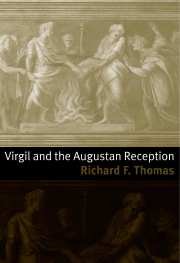Book contents
- Frontmatter
- Contents
- Acknowledgements
- Prologue
- Introduction: the critical landscape
- 1 Virgil and Augustus
- 2 Virgil and the poets: Horace, Ovid and Lucan
- 3 Other voices in Servius: schooldust of the ages
- 4 Dryden's Virgil and the politics of translation
- 5 Dido and her translators
- 6 Philology and textual cleansing
- 7 Virgil in a cold climate: fascist reception
- 8 Beyond the borders of Eboli: anti-fascist reception
- 9 Critical end games
- Bibliography
- Index
2 - Virgil and the poets: Horace, Ovid and Lucan
Published online by Cambridge University Press: 07 December 2009
- Frontmatter
- Contents
- Acknowledgements
- Prologue
- Introduction: the critical landscape
- 1 Virgil and Augustus
- 2 Virgil and the poets: Horace, Ovid and Lucan
- 3 Other voices in Servius: schooldust of the ages
- 4 Dryden's Virgil and the politics of translation
- 5 Dido and her translators
- 6 Philology and textual cleansing
- 7 Virgil in a cold climate: fascist reception
- 8 Beyond the borders of Eboli: anti-fascist reception
- 9 Critical end games
- Bibliography
- Index
Summary
Horace and Virgil were old friends.
n. horsfall, Companion 2, n. 14Now I gotta friend who spends his life
Stabbing my picture with a bowie-knife
Dreams of strangling me with a scarf
When my name comes up he pretends to barf.
bob dylan, I shall be free no. 10The earliest surviving form of Virgilian reception is to be found in the Latin poets who reacted to him. Intertextuality and allusive art is a form of hermeneutics, and, when engaged with ideological purposes of its own, the alluding text's relation to the source text and its very effect on that text may become complex and difficult. This chapter looks selectively at some of the ways Virgil's poetry was received and manipulated by contemporary or near-contemporary poets. The initial emphasis is on Horace, who offers the most immediate reception of Virgil, and whose reading may, prima facie, be suspected of being the most strongly Augustan available. I have not treated the elegists before Ovid, nor have I taken the inquiry as far as Flavian epic, since Ovid and Lucan seemed to provide sufficient evidence of a reception of oppositional elements in Virgil.
De amicitia
It is my contention here that there are no very good grounds for believing that Virgil considered Horace a great friend, and that further (and more importantly for our purposes) Horace may have been “correcting” Virgil in his allusion to him, and in the process neutralizing the older poet's ambivalence and thereby “Augustanizing” him. In other words, I maintain that Horace may be seen as the first Augustan reader of Virgil.
- Type
- Chapter
- Information
- Virgil and the Augustan Reception , pp. 55 - 92Publisher: Cambridge University PressPrint publication year: 2001
- 1
- Cited by



